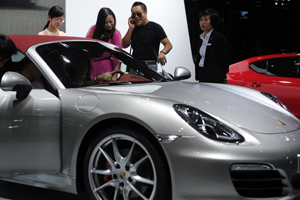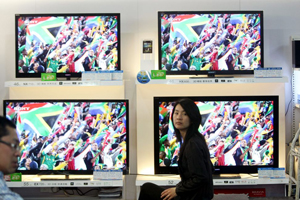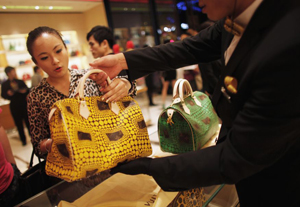A well written insight into China. The takeaway is that we are all human with strength’s and weakness’s regardless of race color or religion. Aivars Lode
The United States has the White House, Russia the Kremlin, France the Elysée Palace and Germany the Federal Chancellery, but what the People's Republic of China has is a secret.
High, red walls shield the country's leaders in this mysterious place, armed security personnel are posted in front of heavily guarded buildings with poetic names like the "Hall of Purple Light," and hidden cameras monitor every step taken in the direction of China's inner sanctum. The complex, covering about one square kilometer (roughly 250 acres) near Tiananmen Square in the Beijing city center, is called Zhongnanhai. The buildings, set in landscaped grounds, are both the headquarters of the Communist Party and the seat of government.
But Xi's triumph will be overshadowed by a scandal that, like so many others, speaks volumes about corruption in the inner circle. It wasn't long ago, in December 2010, that Xi paid a visit to Bo, the then party leader in the southwestern city of Chongqing, where he praised his unconventional approach in the megacity as "outstanding." And although all images and quotes from the meeting have since been deleted by the government media, they appear in blogs everywhere.
The United States has the White House, Russia the Kremlin, France the Elysée Palace and Germany the Federal Chancellery, but what the People's Republic of China has is a secret.
High, red walls shield the country's leaders in this mysterious place, armed security personnel are posted in front of heavily guarded buildings with poetic names like the "Hall of Purple Light," and hidden cameras monitor every step taken in the direction of China's inner sanctum. The complex, covering about one square kilometer (roughly 250 acres) near Tiananmen Square in the Beijing city center, is called Zhongnanhai. The buildings, set in landscaped grounds, are both the headquarters of the Communist Party and the seat of government.
If China has a heart, this is where it beats. But if there is one thing at work in Zhongnanhai, it's the country's brain. And while the traffic rages outside on nearby Chang'an Jie, a ceremonial avenue, insiders report that a ghostly quiet prevails inside the mysterious complex, almost like the silence in the eye of a typhoon -- and just as dangerous, as is now becoming evident in the dramatic struggle for power in this enormous country of 1.35 billion people.
The grounds were once part of the Forbidden City, where emperors, concubines and eunuchs spun their court intrigues. Some of the buildings stem from China's feudal days, while a number of gray, functional buildings were added after the Communist victory and proclamation of the People's Republic in 1949. Revolutionary leader Mao Zedong was conscious of the symbolic importance of the place, and it took months before he felt at home there. Sleeping in the bedrooms where emperors once slept meant donning the cloak of absolute power and claiming the Mandate of Heaven. It was as enticing as it was dangerous.
China's Ascent Undisputed
To this day, the party hasn't dared to engage in an open discussion of excesses, like the Cultural Revolution in 1966 and the 1989 Tiananmen Square massacre, or even to attempt a re-evaluation of the events of the day. Civil rights activists who openly deplored the government's lack of action in this respect ended up in prison. Politically speaking, there is little evidence of liberalization.
On the other hand, China's phenomenal economic ascent is undisputed. Its gross domestic product has increased by about 30-fold in the last three decades, and the Chinese economy has already surpassed Germany and Japan and will soon overtake the United States. "Never before in history has so much wealth been created in such a short time," says Roderick MacFarquhar, an expert on China who teaches at Harvard University.
And no other country has accumulated anything even close to China's foreign-currency reserves. If Beijing wanted to, it could buy up all the firms listed on Germany's DAX index of blue chip companies, and to do so it would only have to spend about one-third of its reserves of $3 trillion (€2.28 trillion).
But China's rulers want more than that. They want to see their country acknowledged as a model, and as an alternative to the Western form of government. And indeed, politicians in Africa and Latin America (as well as many business leaders in Europe) have warmed to the idea of unfettered capitalism without elections and devoid of other, democratic elements that supposedly stand in the way of planning certainty. In essence, what the Chinese model offers is that of a mild dictatorship with one-party rule, in which the best managers prevail, but only after productive and sometimes contentious discussions over the best approach.
A 'Consensus System'
According to United States diplomats whose classified reports from Beijing were published through WikiLeaks, a "consensus system in which members can exercise veto power" but then feel committed to the joint decision prevails in the Politburo, which consists of 24 men and one woman. There is nothing the party fears more thanluan, or chaos, and nothing it preaches more staunchly than hexie shehui, or harmonious society. The body that is primarily responsible for achieving hexie shehui is the Central Politiburo Standing Committee, which meets in the southern part of the Zhongnanhai sanctuary. The nine-member committee is China's most powerful political entity, and both the president and the premier are recruited from its ranks.
Once a decade, the party feels obligated to change its leadership and rejuvenate itself. That point has now been reached once again as both President and General Secretary Hu Jintao, 69, and Premier Wen Jiabao, 70, withdraw from the top echelon. Their goal is to make room for younger leaders and, in the process, to show their people and the rest of the world that the People's Republic is a model country that can successfully complete a harmonious transition. In 2012, this transition coincides with a critical decision on the country's future direction, important to both China and the rest of the world: Should the economy, which has lost some steam in recent months, continue to be privatized while the overall system is democratized? Or will the Communist Party opt for more of the same, and even the flexing of its military muscle and possibly an armed conflict with Japan? And in light of recent scandals, is China increasingly being run like a business with mafia-like structures?
In the eye of the storm are two of China's best-known politicians, both of them highly respected Politburo members and recognized internationally as future leaders of the global power: Bo Xilai and Xi Jinping.
For the two men, the steep path to the top seemed all but certain in early 2012. They were standing at the last station before ascending to the summit of power, and everything else was merely a formality. Bo, 63, was seen as a possible new member of the Standing Committee, while Xi, 59, was expected to assume the highest offices in the country and party. Theirs were storybook careers, as uncannily similar as their life stories. Both men were so-called "princelings," whose fathers had already held top spots in the Communist Party hierarchy. Each man had been divorced and then married a second wife who was known throughout the country. Both men sent their children to Harvard. And both are from families that have amassed astonishingly large fortunes worth hundreds of millions of dollars.
But their respective fates have diverged widely since the spring of 2012, when Bo was stripped of his official positions and ejected from the party. Today he is being held in a secret location to await his criminal trial. Xi, on the other hand, will in all probability be appointed to the top positions at the highly anticipated party congress in early November.
Will Xi, the master tactician, address the scandal at the center of power in his speech? What sort of language will the new top dog use to distance himself from the offences of his former fellow party member, a man as colorful as he was popular, without harming the Communist Party? And could Bo, like his wife, face execution? Or will some of his offences be swept under the rug, because of the risk of exposing the failings of the power elite?
The lives of both Xi and Bo symbolize the rise and fall of political fortunes in China. They are two lives that dramatically illustrate the wide disparity that still exists today between pretense and reality in a country that's become an economic miracle. And they also demonstrate how thin the glue is that holds China together, and how difficult it will be to govern this country in difficult times of declining growth, social tensions and an aging population.





